Photo

Press Ctrl+F or ⌘F to do a quick search!
bookboon // for accounting, business, economics & finance, engineering, IT & programming, languages, marketing & law, natural sciences, statistics & mathematics (+ career & study advice, strategy & management)
booksee // for arts & photography, biographies & memoirs, business & investing, computers & internet, cooking, entertainment, health, history, home, law, literature & fiction, medicine, references, religion, science, sports, travel, and other categories
bookstacks // for popular classics
boundless // for accounting, algebra, art history, biology, business, calculus, chemistry, communications, computer science, economics, education, finance, management, marketing, microbiology, music, physics, physiology, political science, psychology, sociology, statistics, U.S. history, world history, writing
california learning resource network // for mathematics, science, history
ck-12 // for elementary math, arithmetic, measurement, algebra, geometry, probability, statistics, trigonometry, analysis, calculus, earth science, life science, physical science, biology, chemistry, physics, sat exam prep, engineering, technology, astronomy, english, history
college open textbook // for anthropology & archeology, art, biology & genetics, business, chemistry, computer science, economics, engineering & electronics, english & composition, health & nursing, history, languages & communication, law, literature, math, music, philosophy, physics, political science, psychology, science, sociology, statistics & probability
Keep reading
81K notes
·
View notes
Text
so i have trouble becoming fluent in another language (as many of us probably experience), but i found this app called HelloTalk where you can talk to native speakers! i know there are other apps like this but this one is THE BEST. you can have many different conversations with others (i’m talking to 10 people on the app rn). it’s so useful since it shows the correct grammar in the chat. check out this conversation i’ve been having with someone:
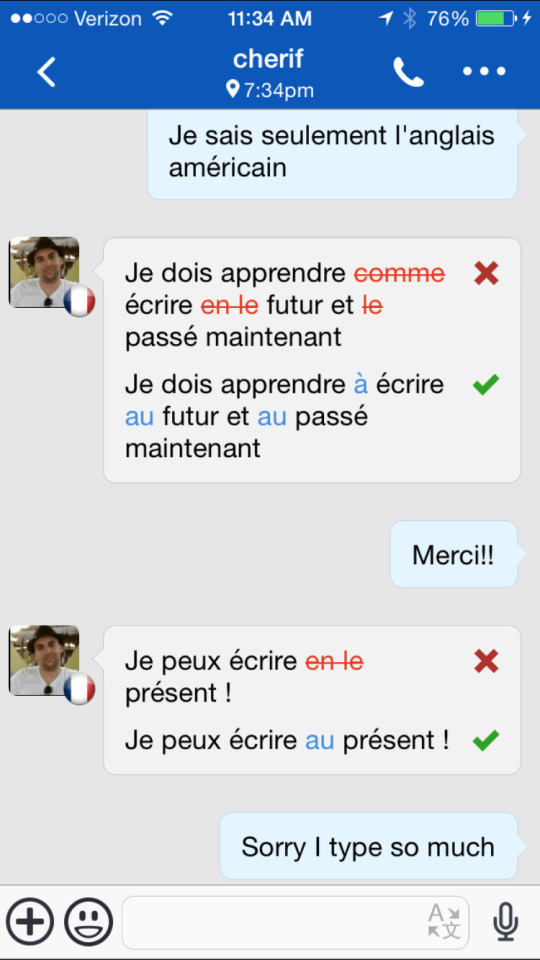
also you can send audio clips to practice speaking so it’s not just about reading/writing. i’m just so happy i get to use this quality app that helps me so much before i study abroad in france. definitely read more reviews and check it out here if you wanna practice another language!
16K notes
·
View notes
Text
shitty advice of a college student. (part two)
(read part one here.)
sit where you’ll pay attention. sometimes this doesn’t necessarily mean sitting in the very front; personally, I like to sit more in the middle. it gives me a good view of my professor and at the same time makes me feel a lot less self-conscious.
not sure about shit? talk to your professor. email your professor. clarify things and show that you’re a student who cares about more than just showing up.
get to class on time!!!
when you email professors always say THANK YOU for their time and help! remember that they’re not required to put in extra time to help you; but the good ones just do. make these people love you!!! a good relationship could turn your B+ into an A- at the end of the semester.
reaching out to both your classmates and your professor when you’re absent is your responsibility.
please eat. and drink water. everyday. I mean it.
being a good student means that you will have shitty days. a lot of them. sometimes things go wrong, or you have more work than you can handle, or you end up getting a C on a quiz you thought you studied your ass off for. that’s okay. life happens. shit happens. let yourself feel shitty sometimes.
once again: let yourself feel shitty sometimes.
unless you want to die, don’t cram for your exams!! plan ahead. study a little bit every day so that the information is retained and you don’t have to study as much the night before. the process works. planning ahead will actually make you work less. trust me.
know that mistakes happen and life goes on. sometimes there’s just nothing you can do to change something. acknowledge that you’ve done everything you could, it was worth trying, and move on. mistakes happen so we can learn from them.
be realistic with your daily to-do list. if you spent all night studying your ass off for that mid-term and you know that you won’t have the mental energy to get a whole list of things done the next day, then they can wait! pace yourself and get done as much as you are capable of doing in one sitting.
you don’t have to look gorg going to class but if putting together daily looks and getting ur face beat gives you that motivation to go to school than you go girl!!!!
it does not matter if another student your age seems like they have it all together; because chances are, they don’t. no one does. we are all struggling to get shit done. we all have our own journeys. it is not a competition. no path is more valuable than another.
stress doesn’t mean you’re entitled to being an asshole. the people in your life probably know that you have a lot on your plate. they’re trying to live their lives as hard as you are. don’t be a dick about it.
7K notes
·
View notes
Photo
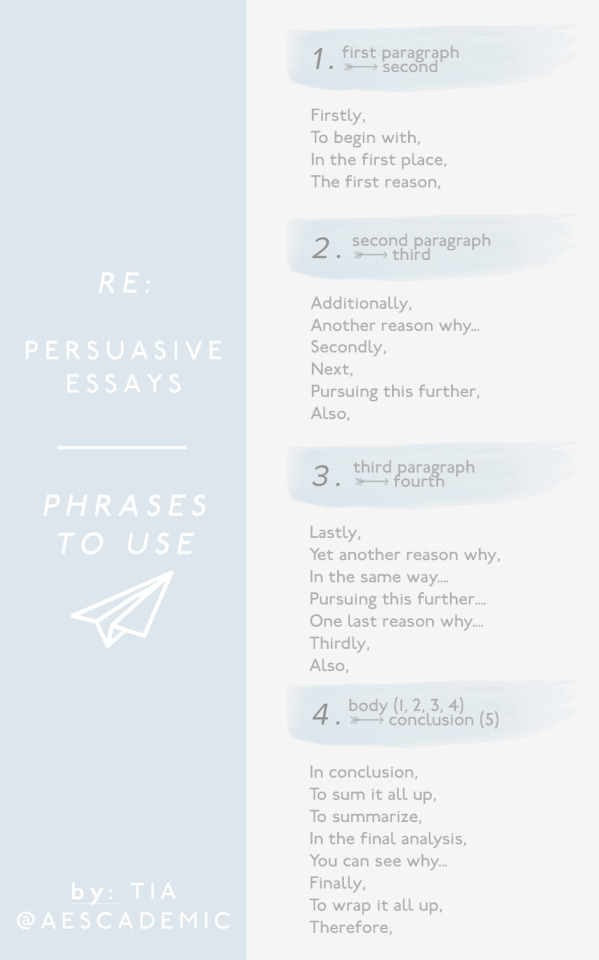
transitional words for essays [source] / [click for high res!]
→ some transitional phrases for essays, made into an infographic…! —tia ��
[+++] more infographics / uploads / have a question?
5K notes
·
View notes
Photo

Some verbs for analysis to help with things like analysis in English literature essays:
• this suggests
• this conveys
• this depicts
• this demonstrates
• this exemplifies
• this highlights
• this implies
• this supports
• this creates
• this reinforces
• this signifies
• this represents
• this reveals
• this portrays
• this emphasises
• this confirms
• this connotes
• this indicates
• this explains
271 notes
·
View notes
Note
Do u have any tips for writing English essays?
i have loads!!!
my tips:
How to analyse primary sources - This was intended for history essays but the principles are true for English essays too.
The best study tip ever for finishing off an essay - This one saved by life during my degree.
How to write an execute a huge piece of work - My tips I learned from writing my dissertation.
general essay writing help:
How to write conclusions by @rewritign
Everything you need to write that bomb-ass essay by @busybby
Essay checklist by @wonderfullifee
How to write a strong essay by @collegemania
Top 5 tips for essays by @studyfab
How to plan for big research papers by @post–grad
Essay writing quick tip by @academ-icks
How I organise my essay notes by @studyspo
How to write college level essays by @caesarstudies
How to write an essay: history edition by @ccllege
vocab help:
Transition words for your essays by @soniastudyblr
List of powerful verbs for essays/papers by @procrastinationkiddo
other masterposts:
stuff you need to write essays by @studyign
725 notes
·
View notes
Photo
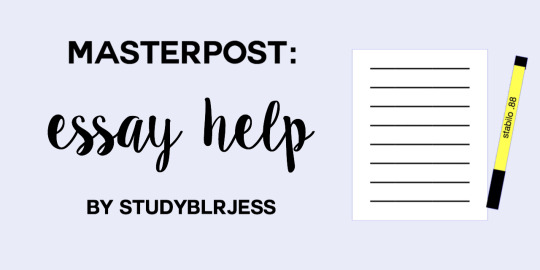
Hello! I decided during the school year to compile all the resources I used while writing essays as well as other posts I’ve found on tumblr. I’m just posting this now… This shows how awesome I am at procrastinating. Just in time for the new school year, here are some of my favorite essay writing resources!
Editing
Grammar Girl’s Editing Checklist by @anomalously-written [literally one of the only editing checklists you’ll ever need]
Readability Score [tells you what level of education someone would need to read your paper, more helpful than it sounds!]
Word Counter [gives you a ton of statistics about what you’ve written]
Proofreading Checklist for the Basic Essay [another great editing checklist]
Title Capitalization [for whenever you’re unsure of what to capitalize in your title]
Grammarly [my favorite spellcheck/grammar check]
Words
Tip of my Tongue [helps you find what word you’re looking for based on letters and meaning]
Transition Words for Your Essays by @soniastudyblr
Descriptive Words by @studyyoassoff
Informal vs. Formal
Adjective Pairs [commonly confused adjectives]
Instead of Very
Tips
This Post by @peanut-caravan
These Beautiful Tips by @ohstudyhun
15 Shocking Student Fails [mistakes to avoid]
How to Write Essays Like Pros
10 Tips to Write an Essay and Actually Enjoy It
The 7 “Fear Nots” of Every Writing Project [excuses to stop making]
How To
How to Structure Essays by @rewritign [awesome awesome resource!]
Ten Steps to Writing an Essay by @sciencescribbles [feat. super cute doodles!]
How to Write Conclusions by @rewritign
How to Write College Level Essays by @caesarstudies
How to Write a Research Essay with Limited Time by @studyspire [great for when you don’t know where to start]
Essay Hooks [helpful for creating your first sentence]
How to Write a Kickass Essay with ½ the Stress
Titles [for when you have an essay but no idea what to title it]
There you have it! Hope these help in your future writing endeavors!
4K notes
·
View notes
Text
How to Write a University-level Essay
Heyo, so school is fast approaching, and seeing as Tumblr is made up of a lot of younger users who will soon be shipping off to college or university soon, I thought I would take it upon myself to help spread my knowledge of essay-writing. Essay-writing is my thing. I love it. I live for it. It’s how I make up for my shitty test marks, and still get by with an 85 average+ in University classes. I’m a historian by trade, so perhaps this information will seem a bit off from what you’re used to, but hopefully, It’ll help you out. If you have any questions, feel free to shoot me an ask.
1. Consider your question and find your thesis.
I know, I know. People always say, no! Never start with your thesis/intro paragraph! Go to the body!! Well i’m here to say forget everything you’ve been told. Forget that, forget the stupid hamburger shit they teach you, forget it all and start reading.
I ALWAYS start with my thesis. Why? Because you cannot make good paragraphs without knowing what you’re researching. You need direction, and a thesis is your map.
So, the question we’ll use shall be: What is one way in which the Union won the American Civil War?
Now remember, your thesis is your map. It shows you where to go, what to look for. The thesis is the heart and soul of all your work. You want a good, solid thesis. What does that include, you ask?
An idea
A reason for said idea
Evidence to support said reason, and thus validate the idea.
56K notes
·
View notes
Text
10 Back to School Tips That Actually Help
So we came up with some back to school tips that we actually do and they work for us. We know that some of you have already started school but we still wanted to share it with you all.
Also: Some of the tips are recommended for before school starts but its never to late to change your routine :)
1. Get a planner/ bujo
This is probably the most important tip. Getting a planner or a bullet journal (or any notebook actually) keeps your organized and on top of homework and classes. Always try to write down your homework as soon as you get it and always put when its due so you never miss a due date.
2. Put your timetable as your wallpaper
This is great if you can’t remember your schedule and you have to keep checking back in a book for it. It’s so easy to always have it when you unlock your phone until you memorize it.
3. Go through your stationery
It’s best to do this before school starts so you can get an idea of stationery you need to buy. Get rid of old pens, highlighters so you never have to worry of running out of ink in the middle of class.
4. Develop a skin care regimen
Like the tip above, it’s usually best to do this a week or two before school starts so you get used to it. If you don’t have face products you should buy ones that suit your skin type so you can look your best on the first day.
5. Clear your work space
Decide on a place you want to do your homework or study and organize it so it’s tidy and there’s enough room for you to work. It’s best when you have a window so you can get natural light to work.
6. Set goals
You can do this each term, month or week (it’s up to you). Use these goals to work harder but goals that are realistic so you don’t become stressed out.
7. Study with a friend
Choose a friend that isn’t easily distracted do you can study together. It’s fun when you have someone to learn with and it makes it less stressful. You can share notes and techniques so you both get good grades.
8. Find out what isn’t working for you
In the past academic year you might’ve tried different things whether it was ways of studying or taking notes or different routines. Before the new year, take note of what wasn’t working for you last year and decide what you’ll do differently this year.
8.1 Discover what works for you
Try out new things in this academic year if you don’t have systems and routines that work for you. Try a new way of taking notes or revise new notes everyday after school. Try new things and at the end of the semester/year reassess and see how much progress you’ve made.
9. Create a sleep cycle
Waking up early for school after months of sleeping in is tough. But if you start waking up early around 2 weeks in advance it not only allows for slip ups but gets your body ready to wake up early for the school year.
10. Create a system for the coming year
After you’ve set your goals for the year and you’ve discovered what you need to do differently this year, come up with a system that helps you to implement those goals. Whether it’s using a grade tracker or getting a planner/bujo or creating a daily schedule, come up with a system that helps you to meet your goals.
BONUS TIP!!
Track your progress.
You can track your progress by comparing grades from the past year to your current grades to see improvement or simply by keeping note of the new things you’re trying and how they’re helping you.
By tracking your progress you not only see how far you’ve come but feel motivated to keep moving forward and working hard.
1K notes
·
View notes
Photo

At some point during college or university, you’ll probably be asked to write a critical review of a text related to what you’re studying. They aren’t commonly done during high school, and so it will probably be an unfamiliar task to start with. Here’s one approach to writing a critical review that I’ve used which has been very successful for me, and hopefully it can help you too!
What is a critical review?
Essentially, a critical review is a summary and evaluation of a journal article, chapter, or book. While critical usually gives a negative connotation, your review doesn’t necessarily need to attack the author’s view point, rather you question the information and opinions they present in an analytical manner, and assess how effective their argument is.
Get to know the text
Start by getting a broad understanding of the text. Skim read it by looking at chapter titles, headings, introduction, opening sentences of paragraphs, any tables, graphics, or diagrams, and the conclusion.
Briefly outline the author’s aim and their main points. You’ll come back to this when assessing how well they have argued their point!
Read the entire text. With the author’s aims and main points in mind, read the entire text and note what evidence they use to support their points, how convincing their reasoning is, how they deal with opposing arguments, how the text is structured and styled, etc. I like to use a physical copy of the text so I can highlight and annotate important parts!
Get to know the author! While not always necessary, getting to know the author, their area of specialisation, and if they associate with a specific approach to the subject can help you better review the text.
Read widely around the topic
So you’ve read the text you’re reviewing and have a good understanding of its content and how the author has argued their point, but how does it fit into the wider literature? Does the author hold a more mainstream view of the subject, or are they more radical in their thinking, presenting a view in opposition to other academics?
Look at their references. Did they cite another academic who holds a contrary opinion? Their work may be worth reading to assess what the author of the text you’re reviewing may have intentionally left out!
Read reviews of the author you’re reviewing. As students, we’re not always as fully aware of a topic as other academics who specialise in the area are. If you’re able to find reviews written by other academics on the author you’re reviewing, they may be able to highlight areas of further research for you to investigate!
Read completely different views of the topic! My most recent critical review was from the a social historian. To gain a broader perspective of the topic, I read interpretations from Marxists, to Revisionists, and other social historians. These different interpretations of the same event allowed me to assess each argument and form my own conclusions based upon how convincing the interpretation was argued.
Read the works of prominent academics in a field. They often inform other academics and help develop approaches to a topic. Note, however, that prominence doesn’t mean their argument is perfect!
Structure and content
Not every critical review will have the same structure, but I tend to follow a similar skeleton structure outlined below.
Introduction - identify the author, the title of the text, and when it was published. Briefly explain the main findings of your review and the key ideas.
Summary - to give the reader an understanding of the text, you need to provide a summary. Pull out the author’s main points and conclusions. Don’t give a lengthy narrative description of the text, focus on the author’s argument. This shouldn’t be more than one or two paragraphs!
Critique - this is the core of your review and will be the bulk of your essay. Here are a few things to think about when writing it
Identify the text’s strengths and weaknesses. You can do this by comparing it to other texts on a similar topic
Does the author present a particular approach to the topic?
How do they consider alternative approaches?
How do they use evidence to support their claims?
Does the text structure and style affect your understanding?
Has anything been left out intentionally?
Support your review with examples from within the text!
Conclusion - restate your overall opinion of the text. Discuss how it fits within the broader scope of literature on the topic and how useful it is. You could even suggest possible improvements and suggestions for further investigation!
I hope this is helpful, and good luck with any critical reviews you have to write! My inbox is open for any questions you might have!
Other essay writing masterposts:
how to write conclusions
how to structure essays
how to reduce your word count
understanding the question
how to write a killer unprepared text essay
6K notes
·
View notes
Text

one of the hardest things to do as a college student is managing your time. you have friends to hang out with, parties to go to, papers to write, exams to study for, classes to attend, netflix shows to binge, and jobs to work. you only have 168 hours in a week, how the hell are supposed to get all this done?
*although this post is mainly targeted towards college/university students, I’m sure people at any age will find this helpful!
plan, plan, and plan
literally, the most boring and adult thing ever is planning. Just like anything though, if you want your planner to work for you, you actually have to use it. you gotta actually take it with you to class, take it out when the professor tells you about an upcoming down, and write it down (shocker, i know.) Thanks to the internet, there are many ways to make this more fun and creative! There are so many cute planners and journals out there. Find one and make it work for you!
planners to check out: bullet journals, ban.do planners, big sky planners, happy planner, passion planner, rifle paper co. planner, kikki k planners, erin condren life planner, filofax planner
read your syllabus
the most important part of doing well is reading your syllabus!! when you get it, write down the important dates in both your monthly calendar and your daily/weekly spread. Use reminders for exams and projects as deadlines approach. You do not want to be that person who forgot about the midterm because you didn’t read the syllabus.
create a schedule.
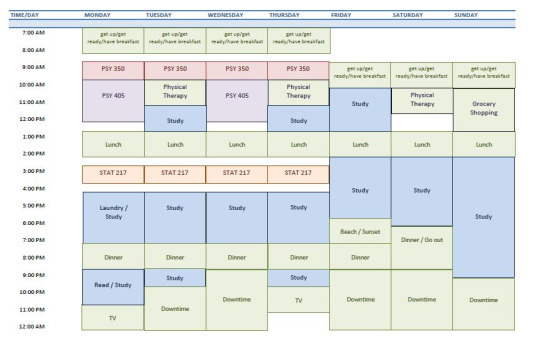
this doesn’t have to be an intense schedule of what you’re doing every minute of the day, but a rough sketch of what your week typically looks like. I had to do this as an assignment in my communications class and let me tell you, it was a life saver. I made this one in exel but I’ve started using google calendars as well! (or you can check out this awesome printable pack by @sara-laughed). It’s a great way for figuring out when/how you’re going to do things.
be realistic and prioritize.
if you need an hour every night to do absolutely nothing, give yourself the time for it. It’ll make your life a lot less complicated when you accept the fact that you will not function unless you get time to relax.
This also means saying no to fun plans for the sake of getting your work done. you’re here to get an education. Instead of spending the day going shopping or playing video games with friends, try going to a nice cafe or library with them instead! You’ll at least get some work done, and you’ll also get to hang out and goof off with your friends.
break it down.
Break down large assignments into smaller junks and spread them out over the time you have to do the assignment. Same goes simple textbook reading. A 45 page chapter is pretty daunting, but if you break it down into 15 page chunks over the course of a week, it’s not too bad. This will a) prevent burnout and b) help you get things done if you have a busy schedule.
take it with you.
if you take the bus to get to campus or to work, you’ve got a lot of time to work on stuff there. You don’t have to pull out your textbooks and start reading, but perhaps reviewing notes/flashcards or brainstorming ideas for your project will be a good use of that time. Those 30 minute bus rides can be a black hole for time. Make it a gold mine instead.
just do it
Ultimately, your success is up to you. All the planning and scheduling in the world can’t make a difference if you don’t just sit down and do the work. Getting started is always the hardest part. Promise yourself you’ll work for at least 15 minutes. If after 15 minutes you’re not into it, take a breather or move on to another task.
still having trouble?
go talk to a counselor, advisor, or trusted professor. They’re here to help you and they want you to succeed. Maybe working 20 hours a week as a full time student just isn’t the best option for you. You have tons of resources available at your university. Use them.
tips:
learn your learning style your life will be so much easier once you understand what works for you.
know what you have to do. I like to make a to do list everyday, but if you’re using your planner correctly, that should be good enough.
check out some apps to help minimize procrastination and distractions
keep some school/office work with you at all times. that 30 minute wait at the doctor’s office? boom. study session. you can cross that off your to do list
mess around with your schedule. try doing different things at different times. Maybe going grocery shopping at 3 pm when everyone and their mother is doing the same thing isn’t the best idea.
helpful links:
surviving college
time management strategies
getting your shit together by yours truly
a great pdf on time management
my tag on study tips
my tag on productivity
my tag on time management
other posts by me
6K notes
·
View notes
Text
No to Low Stress College Study Strategy
I started using this study method my 2nd month of college, when I realized that it was better for study-life balance and my emotional wellbeing. It makes me feel productive and alert all day, and gives me plenty of free time to pursue hobbies, clubs, and personal interests. It sounds kind of hardcore at first, but it’s seriously wonderful if you give it a try! Here’s the game plan:
After the first few days of the semester, I sit down with all of the syllabi from all of my classes and write down every single assignment for the rest of the semester into my planner. Include exams, readings, lab report due dates, worksheets, essays, etc. Everything.
Every weekend, I set aside however much time I need to knock out every single assignment for the upcoming week that is possible to do in advance. I do my textbook readings, textbook practice problems, my humanities readings, short essays or write-ups to accompany those humanities readings, etc.
Even though I’m doing more work, I generally spend the same amount of time in the library as my friends who only do their work for Monday over the weekend. This is because if you don’t commit to doing a large number of assignments, you tend to spend a lot more time on minor assignments than is truly necessary - do I really need to spend 3 hours on this 1-page essay for my English class if it’s only graded on a 10 point scale? Couldn’t I finish this in 1 hour and then devote more time to the rest of the readings I need to do for that class this week?
I still have enough time to sleep in, have long lunch breaks, go the gym, go to parties in the evening, etc.
You can do this, no matter your workload. I am a pre-med science major taking 20 credits (max course load) a semester, with two labs, and I can get it done. My roommate is an English major with heavy novel reading assignments and she can get it done. (Disclaimer: this mostly applies to undergraduates.)
Research papers and midterm exam studying generally get their own day separate from homework assignments. I like writing essays in 1 or 2 sittings, but if you like to spread it out just break up the essay into manageable pieces and do it over multiple weekends, or do the pieces between classes (see next bullet point).
After blasting through most of my assignments over the weekend, during the week I generally only have to do busy-work that is assigned at the end of classes and continue studying for midterms that week. I easily finish these assignments in the breaks between classes during the day.
With this strategy, I always complete all of my homework well before dinnertime, and often have days when I don’t have any assignments to do. I use this free time for club meetings, hanging out with friends, going to the gym, marathoning Netflix, pursuing hobbies, working a job, whatever.
I also use this extra time to be able to study for exams much more effectively - when you don’t have busywork assignments floating in the back of your mind, it is much easier to focus. You will study more productively and effectively, and with much less stress. Exams are worth way more of your grade than the homework assignments you blast through each weekend, so it’s best to be able to focus exclusively on them Monday - Friday.
The best part about this strategy is that your workload is heavy on Sunday and sometimes Saturday, but you get to relax Monday - Friday. You basically have a 5 day weekend every week, assuming you enjoy going to class.
If anyone also uses this method, I’d love to hear from you or hear your variants/study suggestions! If anyone tries out this method for 1 or 2 weeks and finds that it works for them, I’d love to hear about it! If you try it and hate it with a fiery burning passion and loathe me for even suggesting it, I’d love to hear about it!
I believe in you!<3 No matter what study method you choose to use, just do your best and exceed your own expectations.
40K notes
·
View notes
Photo
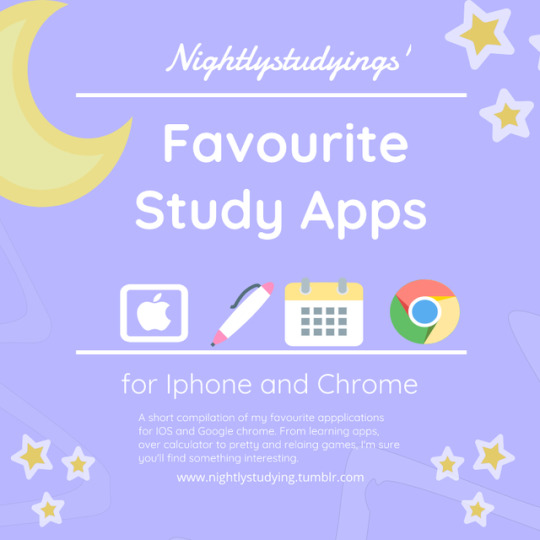
PART ONE - IPHONE
So this is my first post that isn’t a stupid text post or overly bright photo of my stationary, so I hope you’ll like it! It will consist of two parts, one for the ios apps and one for google chrome extensions. Feel free to send me recommendations!
bolded = favourite, cursive = apps I use every day
Note taking and co
Pocket - very useful app to save websites, articles, posts etc and read them offline.
Keynote, Pages, Numbers - basics if you have an apple device. I actually like keynote better than powerpoint c:
Notability - Very popular app and it really is worth its money. Great for note taking, especially in class!
Evernote - On my phone for over 4 years now. The group feature is so great and I use it for preparing posts
Werdsmith - very clean and minimalistic app for writing, I use it mainly for creative writing.
Microsoft One Note - Simple app for note taking and making online notebooks.
Languages
Leo - a great dictionary in 8 languages. If you log in you can save problem words and make vocabulary lists.
Memrise - My favourite app to learn languages for free. I’m learning Japanese with it!
Duolingo learning languages for free is always fun and duolingo is so easy to use, it’s even more fun! I use it to practice my Spanish.
Studying
Forest - Who doesn’t know and love forest yet? It’s such a cute application and I use it when I have a long study day/night ahead.
Brainscape - My to go app for flashcards. It has a giant library and it’s easy to make your own. Honestly, I’ve been using it for 3 years now and I still love it.
Mindly - A very beautiful app to make mind maps. I use it for story ideas and school work.
MindNode - also an easy way to make mind maps.
Uberchord - learn how to play the guitar for free c:
TheSimpleClub - videos, and tutorials of all important school subjects, mainly in German, I think
Notenapp - keep track of your grades - German
Khan Academy - like the simple club but with a broader spectrum and in English.
Tide - promodoro app with nice background sounds & inspirational quotes
Swifty - learn how to code in a very fun and simple way!
Flow timer - another great promodoro timer (they are everywhere). I like the minimalistic look and nice colours.
Inspiration & Motivation
Vantage - Simple but beautiful designed calendar
Calm - Helps me calm down with breathing exercises backgrounds and sounds.
Elevate - games and exercises that help to keep your mind fit
Pacifica - an app that helps with anxiety and mental disorders with a very kind community
TED Inspiring, interesting and motivating videos on a wide variety of topics.
Others
Textgrabber & Scanner Pro - Essentials. Scans photos and grabs texts of pdf and other documents and converts them into word/text documents.
Sleeptown - From the makers of forest a very cute app that helps you keep a healthy sleep schedule. I try to use it but I forget it often, sadly.
Tydlig - not free but honestly the best calculator you can have on your phone! Beautiful and simple it makes math so much more fun!
Spark - organizes your emails (even from multiple accounts) and notifies you if something important comes in. Very neat design.
Moon - cute app that shows the phases of the moon depending on the date.
Plant Nanny - keep track of your water intake by watering cute plants (they have something similar for walking and keeping track of expenses!)
17K notes
·
View notes
Text

Hey, guys! This last semester I’ve taken a class in academic writing, focusing especially on essays, so I thought I’d share some of the tips I’ve learned :)
Step 1: Preparation
Brainstorm!
Once you know what you’re writing about, have a quick brainstorm about what you already know on the subject. It may also give you original content that you won’t find in your research which is great!
Research!
It sounds boring & time-consuming but it’s so helpful. Look online, at articles & books, they are all a great source of information. And you can find them all for free at your uni/school/local library!
Make sure when you find a source you want to use, you keep it to reference later. I like to bookmark them all in a folder that I can come back to later when I need to reference.
Organise!
All the points you’ve gathered from your brainstorm & research can be put into a simple mind map or list form which helps you plan out where in your essay each point should be placed. This will make the writing process much easier & faster.
Step 2: Write
Topic Sentences
Before you write your introduction come up with 3-7 (depending on how long your essay needs to be) topic sentences. These are opening paragraph sentences which introduce your point & relate it to the essays main topic. They don’t need to be used to introduce every new point but are a good place to start & a good warm up for the actual writing of the essay.
Introduction
The introduction is very important, it gives the reader a taste of what the essays going to be about, the writing style & introduces the main topic. It should be concise yet give enough information to give the reader a real grip on what they’re about to read. It should include your thesis, a strong sentence which sums up the main point. I also like to make introductions somewhat thought-provoking, to allow the reader to create their own ideas on the subject but this depends on the subject, sometimes you’re going to want to be more definite.
Main Points
The main body of the essay should explain or expand on your topic. It’s a chance to get your points across, show the reader what you know. Every main point should get its own paragraph(s). Each paragraph must have a reason to exist; it should relate to the main subject, develop the point and fit in with the overall flow of the essay. Also, make sure a paragraph only deals with one point/idea! Otherwise, it may get too confusing!
Conclusion
Your conclusion doesn’t have to be long & don’t use it to list your points. It should be a nice, solid end to your essay that leaves the reader with an impression. Also, it’s best not to put in a new idea in the conclusion, just use it as one of your main points instead!
Step 3: Check
References
Don’t forget those annoying references. They’re a pain but it’s better to have them done. Make sure you’re using the right referencing style for your institution! A quick google search can easily help with any problems you may have!
Proofread
This is something I hate doing but is actually so important. Errors in an essay can sometimes stand out more than the good points and can lower the standard of the essay. Make sure you read & reread!
I personally hate rereading my own writing so I use Grammarly as much as I can. Grammarly is a free automated proofreader which corrects as you type. It underlines any errors and when you click on them it gives you corrections (which also helps you learn & fix your common mistakes for yourself!). It’s available for Chrome, Microsoft Office, Windows etc. I’ve honestly found it so helpful for proofreading & really believe it helps me improve errors I wouldn’t have noticed myself.
Plagiarism
Obviously, don’t knowingly plagiarise, but if you worry that your work is going to be similar to someone else’s you can check online how similar your essay is. It can be a good thing to check before you submit, just for peace of mind!
*some links are affiliate but I only support products/brands I love & use myself
Instagram || Other Posts || Resources || About || Ask
2K notes
·
View notes
Photo

hey guys! i’ve been seeing a lot of master posts going around so I thought I’d compile some together for college students :^)
Discounts (stores):
Amazon Student // 6-month free Prime trial on Amazon if you have an .EDU e-mail. Includes students deals, free shipping, streaming of thousands of content, etc. You can also get one free month here if you don’t have an .EDU e-mail
Ann Taylor // 20% off
ASOS //10% off
Banana Republic //15% off full-priced items
Club Monaco // 20% off items
Eeastern Mountain Sports // 20% full-priced in-store items
Eddoe Bauer // ask about discounts at local store
Joanns // 10% discount
Madewell //15% off in-store
Modcloth // 10% off
Sally’s Beauty Supply // sign up online for coupons
Sam’s Club // requires membership
Target // varies, mainly online
Tom’s // 10% cash back
Topshop // 10% off
Urban Outfitters // 10% off on Student Days
Discounts (tech):
Adobe // 60% on Creative Cloud
Apple // various savings (You must input your school and other information. Link in name)
AT&T // 10% discount (You must input your school email address. Link in name)
Best Buy // sign up for student discounts and coupons
Das Keyboard // special pricing through website
Dell // discounts on laptops and tablets
Fujitsu // 5% on LIFEBOOK notebook and PCs. (You must call 1-800-FUJITSU for the deal)
HP // various discounts through website
Journeyed // various discounts through website
Microsoft // various discounts. (Check through your school as well to see if they have partnerships with Microsoft)
Norton // various discounts through website
Sony // up to 10% off (You must register to get the discount. Link in name)
Sprint // various discounts (Check with your provider. Link in name)
T-mobile // 10% off monthly bill (Check with your provider. Link in name)
Verizon // up to 20% off monthly bill (Link in name is to the EMPLOYEE DISCOUNTS page. Input your school email to see if you qualify.)
Food:
Chick-Fil-A // free small drink with order
Chipotle // free small drink with order
Dairy Queen // their website says they have one but I haven’t gotten a chance to go in and ask yet. Their Student Discount section is towards the bottom under local community partnerships.
Firehouse Subs // their discounts may require a partnership with the school so please ask about the discount to see if stores not near campus still offer the discount with your ID
Hard Rock Cafe // offers a student/discounted menu. Hard Rock cafes are located in Hard Rock Casinos.
Krogers // 5% discount off total order
Pizza Hut // 10-20% off (depending on store)
Sweet Tomatoes // 10% off (website says many stores but not all so please ask about it at your local store)
Subway // 10% off (again at specific locations so please ask about it at your local store)
TCBY // 15% off
Waffle House: 10% off
Guides:
How to get your best grades in college
The ultimate guide to college organization
How to write the perfect college essay
The ultimate guide to packing for college
How to stay calm and reduce stress during college
45 tips for staying organized in college
How to prepare for college over the summer
5 best apps for college students
How to make a study plan for finals
College is not “one size fits all” (and that’s a good thing)
More helpful blogs:
onlinecounsellingcollege
fyeahcooldormrooms
freshmantips
theprospectblog
essay-storage
Studying:
Flashcards
Calculators
Online Ruler
Thinking & Memorizing Tips
Research & Reading Tips
Finals Help Guide
Homework Help
Math Help
Geography Help
Study Playlist
Convert Anything To Anything
Productive Study Break Tips
Pull an All Nighter & Do Well On Your Exam
AP Cram Packets
Textbooks:
Alternatives To Expensive Textbooks
Download Free Books
Download Free Kindle Books
Free Audio Books
55K notes
·
View notes
Text
Foolproof Guide to School Success!

Hi! I just finished my first year of college and I definitely have to credit the studyblr community for all the useful information and tips! I currently closed the year with a 4.0 and don’t plan on stopping!
In high school I was an ok student but I decided to change all that when I started college. So, whether you’re in high school or college, it’s never late to change and attain academic excellence! So here are my tips!
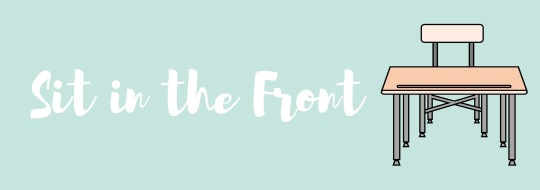
Try to get an early start on your day and sit closest to the front as possible. Studies show that sitting in the front of class will improve your grades and knowledge!
A study showed that those who sat in the front achieved an average of 80% while those in the middle achieved an average of 71.6% on their exams. And guess who did even worse.. unfortunately those in the back scored an average of 68.1%
Distractions are decreased because there’s no one sitting in front of you, just the lecture which basically forces you to pay attention.
This increases the likelihood of your professor getting to know you. Why is that important? Well, in an accounting course I once took, I sat in the front, attended extra tutoring sessions hosted by that instructor, and generally put in extra effort in the class. By the end of the semester everyone was really struggling, over 20 students flunked out, and even my tips weren’t getting me to that A I wanted. Well, because I had established who I was and that I was serious about the class, my instructor bumped my final course grade from an 88% to 93%! She said she noticed the effort I put in so she gave me the grade she thought I deserved
Seriously, sit in the front!!

Ok, now that you have a good spot in the class, make sure you take great notes! The Cornell notes system is great but do whatever works best for you.
Abbreviate often
Date your notes at the top so you can order them chronologically. This will make studying a breeze later on.
Find a color coding system that works for you. Highlight main ideas and vocab.
Find a notebook that works for you. I was lucky enough to score 20 moleskines at my local thrift store at 1 dollar a piece so I’ve been using those.
If you prefer loose leaf paper, buy a bunch and stick it into a flexible binder so you can organize and reorganize your paper.
Use post-its and sticky tabs to add extra info that you might have left out during class. Use sticky tabs to find certain notes faster.
These are some of my favorite note taking supplies:
These Pilot G-Tec pens are some of my favorite pens ever! They are super smooth and the lines are really fine. This 5 pack costs around $11 which is pretty affordable!
Mead notebooks are a classic staple. Seriously these are super durable!
These sticky post-it tab hybrids work really well for marking a page and highlighting important info.
Mildliners are really nice and the colors are not to bright. A pack runs around $7 and a 3 pack is $15 on Amazon.
If you want to go the extra mile, retyping up your notes is a great idea. That way your in class notes can be messy and it won’t matter since you’re going to type them up anyway. One Note is awesome for notes.

I developed my own system for deciding on how I will study and how often I will study. It goes something like this:
Rank your classes in order of difficulty into three sections:
Easy, medium, and hard….
Easy classes get one point
Medium classes get two points
Hard classes get three points
Is the class math related? ….. add 2 points
Is it science related? …… add 2 points
Is the class a subject that you struggle with? ….. add 3 points
is the class AP? ……… 3 points
Add up the points for each class.
Classes with 1-3 points:
these classes are generally easy and have an easy instructor, contain info you already know, etc.
These classes get 45 minutes a day in your schedule and minimal studying on weekends.
Classes with 4-8 points:
These classes might need some more effort so try to…
Set aside an hour a day and 30 minutes on weekends.
Classes with 9 points and up:
These classes are usually more intense, have daily assignments, have a strict instructor, etc.
Set 2 hours a day and an hour or more on weekends. Consider going to free tutoring provided by your school, join a study group, or go to your instructor’s office hours.

Plan your months, weeks, and days in advance! Keep a planner, calendar, or bullet journal. I personally use a bullet journal and keep a calendar printable in each binder I have for my classes.
Include due dates, exam dates, when your rentals are due, etc.
Look at it everyday!!! That way you won’t forget important events.
If you want to, make it pretty! Decorate it with stickers, pictures, polaroids, etc. to make it more personal.
If you prefer minimalism, keep a simple planner or bullet journal system.
If an electronic system works better for you, go for it! But I’ve noticed that writing it on paper works best!
Here are some great planners or journals to use:
Moleskines are always a great choice!
This hardcover Yoobi journal is comparable to the Moleskine and comes in pretty colors! The price is awesome, each one runs at $6!
Bando makes super pretty and trendy planners. They run from $20 and can get pricey though. It’s definitely worth it though!
This Sugar Paper gold polka dot planner is really cute and super affordable!
The AT-A-GLANCE planner has a monthly view and daily sections with plenty of room for writing in important dates and decorating with cute stuff!
Kikki K has amazing planners. If you want to splurge consider their stuff. I’ve always wanted one but it’s around the price of a textbook :(

While Studyblr has so many resources and tips, in case you haven’t noticed, a lot of the pretty pictures use muji pens, staedtler fineliners, and those cute lil’ backpacks. Remember that you have to use supplies that work with you. Here are the essentials to carry with you:
Notebooks and binders
A sturdy and comfy backpack. I use the Borealis backpack by The North Face on discount. Make sure it has comfortable straps, back support, enough room for all your stuff, and compartments for your food and water bottle.
A phone charger. Keep it in your backpack. My phone has died on me so many times and it sucks, especially if you have to take the bus. Invest in a portable charger.
Earbuds are a must, especially if you take public transportation. Also great for when you’re at the library, gym, etc.
As previously mentioned, a water bottle and FOOD! Pack a lunch but also have backup snacks like granola bars or nuts. You need food and water for energy.
Keep extra change. You never know when you need it!!
Your planner.
Pens, pencils, etc. Especially a stapler if you have homework that you regularly turn in!! Its really awk when someone doesn’t have a stapler and everyone in the class doesn’t either..
A laptop, seriously a must! Chromebooks are affordable!
Hope that’s helpful! Looking forward to another year in college and staying in the Studyblr community,
Thania
15K notes
·
View notes